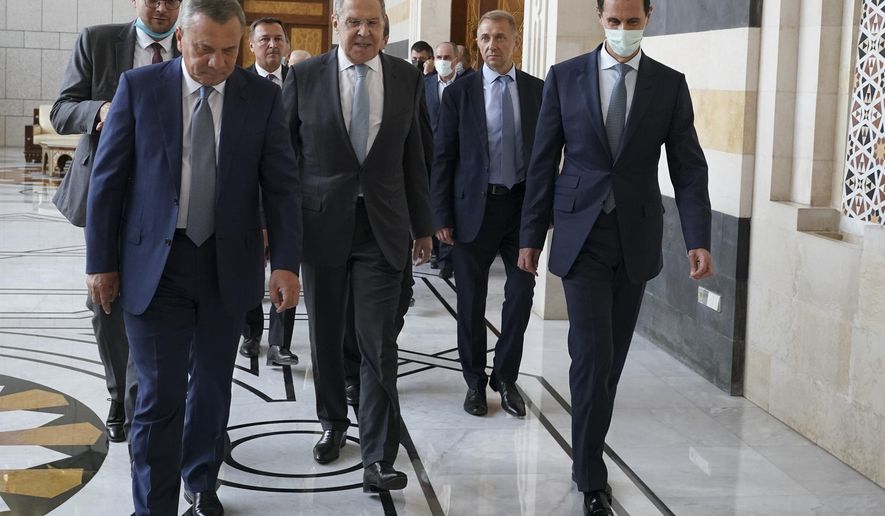DAMASCUS, Syria (AP) - Russia and Syria plan to sign an economic pact before the end of the year that is partly aimed at circumventing U.S. sanctions, Russia’s deputy prime minister said Monday as he led a high-level delegation on a visit to Damascus.
Yuri Borisov said the Russian side is expecting to sign the pact on his next visit in December, adding that it includes more than forty new projects in the energy sector, reconstruction of a number of power stations and offshore oil extraction.
The agreement, he added, would “outline a new framework for trade and economic ties between the two countries for the coming years” while providing relief from U.S. sanctions, which he said were “strangling” the Syrian people.
Borisov spoke at a joint press conference with Syrian Foreign Minister Walid al-Moallem in Damascus after the delegation met with Syrian President Bashar Assad.
Syria faces an unprecedented economic crisis after nearly a decade of civil war and Western sanctions. The economic and financial situation has been worsened by the financial crisis in neighboring Lebanon, Syria’s main link with the outside world and where many Syrians have their money. Syria is also grappling with a coronavirus outbreak.
Russian Foreign Minister Sergey Lavrov, who is visiting Damascus for the first time since 2012, also attended the news conference.
Russia has been a close ally of Assad in Syria’s devastating nine-year civil war, lending his government vital military, economic and political support. Russian troops have been fighting alongside Syrian government forces since 2015, and President Vladimir Putin has visited the war-torn country twice, including in January this year.
With the help of Russia, as well as regional ally Iran and its proxy Lebanese militia Hezbollah, Assad has largely succeeded in crushing the armed rebellion against him. The rebels are confined to the northern Idlib province, where a truce has been in place for months.
But Syria has been ruined, the economy has spiraled out of control, and the country remains divided. Turkey-backed forces control a sliver of territory along the border, and U.S.-backed Kurdish forces control an oil-rich area in the northeast.
“We have to admit that most of the areas rich in oil and gas are outside the control of the Syrian government,” Borisov said Monday. “This fact prevents the Syrian government from trading in oil, given that it is an important source of revenue.”
“The same applies to agricultural lands,” he added. “After Syria used to export grain, it now imports it. … This harms food security.”
Borisov blamed the United States for the economic deterioration in Syria, which risks reversing the government’s recent military gains, calling U.S. policies “unconstructive.”
“The most important reason for the tragic situation in Syria is the devastating situation of the United States of America, in addition to the Kurds’ unwillingness to communicate with Damascus and hand over control to the legitimate government over agricultural areas and oil fields,” Borisov said.
Lavrov also criticized U.S. and Western sanctions on Syria, saying they are “trying to strangle the Syrian people.”
“Our visit to Syria focuses on the prospect of cooperation to develop relations between the two countries in light of new developments in the region,” he said.
The Syrian pro-government Al-Watan newspaper earlier quoted Syria’s ambassador to Russia, Riad Haddad, as saying that the Russian delegation’s visit “is of special importance, given the political and economic files that will be discussed.” Those include progress by a committee discussing possible amendments to the Syrian constitution and Western sanctions on Syria, as well as efforts to fight terrorism.
Talks between government, opposition and civil society delegations resumed in Geneva late last month on a possible new constitution for the country. The U.N.’s envoy for Syria, Geir Pedersen, has called the talks a prospective “door-opener” to a final resolution of Syria’s long-running conflict.
The pandemic forced the postponement of an earlier meeting in March.




Please read our comment policy before commenting.